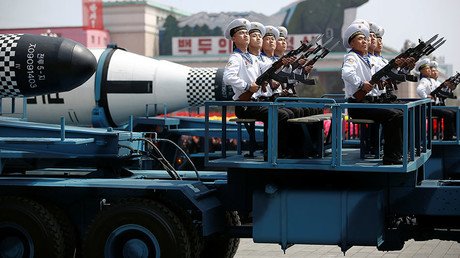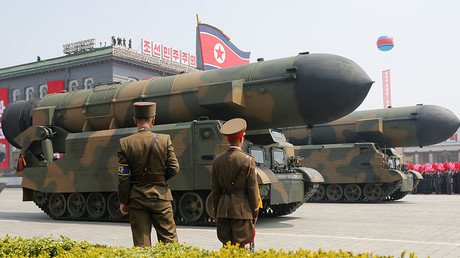‘Trump’s stance toward North Korea goes from one extreme to another’
The US is trying to use its influence to make a problem that has been around for 60 years and to provoke a reaction from North Korea before the possible return to the 'Sunshine Policy', says Daniel McAdams, executive director at Ron Paul Institute.
China’s Foreign Ministry spokesperson Geng Shuang has urged the US and North Korea to “remain calm and exercise restraint.” He also called the situation between the two countries "highly complex" and sensitive.
This comes as tension continues to flare between the two with seemingly empty threats and shows of strength being traded.
RT spoke with executive director at the Ron Paul Institute, Daniel McAdams who suggests the motives behind the posturing are hard to comprehend which is perhaps the desired effect.
“The fact of the matter is that there have been a couple of tests in recent weeks that the US has made with intercontinental ballistic missiles. You can’t help but suspect that there is a message involved in these tests,” he told RT.
In his opinion, “President [Trump] has gone from one extreme to the other saying ‘something very bad may happen soon’ to ‘why not have Kim Jong-Un come over to the White House and have a talk’. Maybe the intent is to keep North Korea off guard. Maybe it is to have them think that Washington also has strange and unstable leader - it is hard to tell.”
McAdams continued saying that the US is trying “to use intimidation. It is also trying to get China do its bidding.”
He further claims “China has limited influence over North Korea. There is an enormous amount of downside to both China and Russia if the North Korean government implodes, if society implodes, if the economy further implodes.”
“But I do think the US government is trying to use its influence, is trying to for some reason to make a problem that has been in existence for some 60 years plus. All of a sudden now it is an urgent problem that needs to be immediately addressed. I think this is a created crisis in Washington DC and it makes very little sense,” he said.
According to McAdams, “the US military exercises along with Japan and South Korea are meant to send a signal to North Korea as well.”
In his opinion, America’s joint military exercises with Japan and South Korea are meant to send a signal to Pyongyang.
“They have a very strong effect, as the US would feel if hostile neighbors would conduct military exercises in our backyard, we would feel intimidated. I think there is also an element of South Korean politics involved as well,” McAdams said, adding that South Korea is in a sort of a lame duck period ahead of the presidential election on May 9.
“The next presidential election is set to favor Moon Jae-in who has taken a much more nuanced approach to US foreign policy. He has explicitly warned the US not to get involved South Korea’s democracy and elections. He may be a tougher nut for Washington to crack,” he added.
McAdams suggested that “may explain why Washington in this interim is putting in the THAAD missiles, is accelerating the military presence, is moving ships closer to North Korea trying to perhaps provoke a reaction before things may have to cool down and back down, perhaps even return to the Sunshine Policy which wasn’t all that bad.”
The statements, views and opinions expressed in this column are solely those of the author and do not necessarily represent those of RT.















